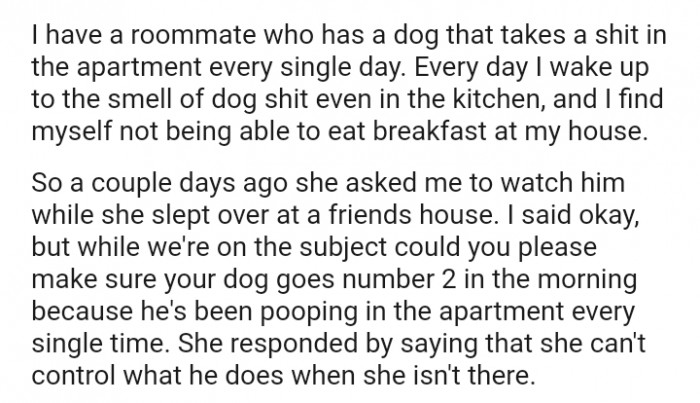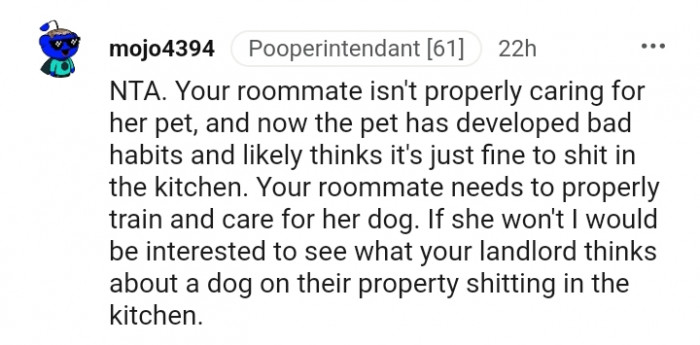Lady Demands Her Roommate Take Care Of Her Dog Who Messes Up Their Apartment Every Day
As a dog owner, you want to ensure that your dog is receiving the best care possible. To maintain your dog’s health and happiness, you must be knowledgeable about basic dog maintenance and how to attend to its needs.
Having the proper perspective is the first step in properly caring for a dog. Let’s talk about when a dog is doing its business.
Bacteria and parasites found in dog excrement can contaminate water, soil, and even humans. Even if your dog doesn't exhibit any signs of illness, its feces might harbor viruses that are dangerous to both humans and other animals.
While picking up dog poop can be annoying, ignoring it can result in more serious issues due to its negative effects on the environment and the fines that come with it. It's simpler for everyone when you clean up right away after your dog!
Not to mention that your house won't smell at all, but in today’s story, the odor from the dog’s poop doesn’t even allow the OP to have breakfast in peace. The OP took to the AITA subreddit community to complain about how her roommate’s dog poops in the house every single day.
She has complained about this to her roommate, but her roommate seems to be nonchalant about the issue. Keep scrolling to read the full story below.
More Info: Reddit
Having a dog doesn't just mean you now have a companion; you also have to clean up after the dog.

She can't control what he does when she isn't there.

I'm just trying not to start my day with this.

Understanding Co-Dependency
Dr. Emily Carter, a clinical psychologist at UCLA, emphasizes that the dynamics between roommates can often reflect deeper patterns of co-dependency.
In co-dependent relationships, one person may feel responsible for another's well-being, leading to friction when expectations aren't met.
This situation highlights how shared living spaces can amplify emotional stress, especially when one party feels burdened by another's choices.
Understanding the Psychology of Shared Spaces
Living with roommates can evoke a range of emotional responses, particularly when personal boundaries are crossed. Research in social psychology indicates that shared living arrangements often lead to conflicts stemming from differing expectations and values regarding cleanliness and responsibility. According to studies, unmet expectations can trigger feelings of frustration and resentment, which may escalate interpersonal tensions.
Understanding these dynamics can be crucial for resolving conflicts peacefully. By fostering open communication and establishing clear agreements on responsibilities, roommates can prevent misunderstandings and promote a harmonious living environment.
I'm confused whether to text her or not.

Dogs require food, water, and shelter to survive, just like humans do. However, for them to flourish, they also need love, physical care, and mental stimulation.
Providing your dog with these essentials is crucial for keeping it safe and healthy, and it also lays the groundwork for a long, fulfilling relationship. The OP’s roommate doesn’t seem to understand her responsibilities as a dog owner.
Here is what the Redditors had to say.
She needs to work with her dog before work.

Being a proper dog owner is not so hard.

Research published in the Journal of Social and Personal Relationships shows that unresolved conflicts in shared living arrangements can escalate into significant relational stress.
When boundaries are not clearly communicated, resentment builds, which can lead to explosive confrontations.
Understanding these patterns is crucial for resolving conflicts healthily.
Behavioral psychologists emphasize the role of reinforcement in shaping behaviors. In this case, if the roommate fails to address the mess, the dog may continue its behavior without any consequences, reinforcing the cycle of neglect. Research shows that negative reinforcement often leads to an increase in undesirable behaviors, as the absence of corrective action signals that the behavior is acceptable.
To break this cycle, implementing a structured plan for pet care responsibilities can be beneficial. For example, creating a shared schedule for dog care and cleanup can promote accountability and reduce frustration between roommates.
She needs to properly care for and train her dog.

She should go for a walk every morning.

The dog has to go if she can't take care of it.

Practical Solutions for Roommate Dynamics
Experts suggest that establishing clear guidelines for pet care and household responsibilities can mitigate conflict.
Creating a shared chore chart or discussing pet responsibilities can help set boundaries and expectations.
Moreover, regular check-ins to discuss feelings and adjust responsibilities can foster a more harmonious living environment.
The Importance of Emotional Regulation
When faced with stressful living conditions, individuals may experience heightened emotional responses. Emotional regulation, as outlined in research from the University of California, Berkeley, is essential for maintaining healthy relationships. Effective emotional regulation strategies can help individuals navigate conflicts without resorting to blame or hostility.
In this context, practicing mindfulness techniques or engaging in problem-solving conversations can enhance emotional regulation and improve communication between roommates. Studies show that individuals who employ these strategies are more likely to reach constructive resolutions.
It’s also important to create a schedule for exercising, even if it’s simply a daily walk around the block. Your dog may need more activity, depending on the breed, to release excess energy and stay in shape.
Here are some more comments below.
She is an irresponsible owner.

A fight is still brewing.

It's her responsibility to train the dog.

Behavioral psychologists note that unresolved issues can lead to negative spiral effects on mental health.
For example, one study found that consistent exposure to a stressful living environment can increase anxiety and reduce overall life satisfaction.
Addressing these issues directly can not only improve the living situation but also enhance psychological well-being.
Conflict resolution strategies are not just beneficial but necessary in shared living situations. A study published in the Journal of Conflict Resolution highlights the importance of collaborative problem-solving in preventing and resolving conflicts. The findings suggest that open dialogue can lead to mutual understanding and compromise.
Implementing regular check-ins or discussions about shared responsibilities can foster a cooperative atmosphere. Encouraging roommates to express their feelings and concerns openly can prevent minor grievances from escalating into major conflicts.
This is inappropriate behavior.

It doesn't have to be all over the place.

Shut the smell out.

The Role of Communication in Conflict Resolution
Effective communication is vital in roommate situations. Research indicates that individuals who engage in open dialogues about their needs and grievances tend to resolve conflicts more effectively.
Psychologists recommend using 'I' statements to express feelings without placing blame, which can help reduce defensiveness.
Practicing active listening can also encourage empathy and understanding between roommates.
Your dog will thrive in an environment that provides good nutrition, preventive veterinary care, health monitoring, grooming, a place to call home, plenty of exercise, and love. Fortunately, it’s not too difficult to give your dog all of these things.
Dog ownership shouldn’t be viewed as a chore but as a life-enriching experience for both you and your dog. So the OP’s roommate needs to do her job.
Psychological Analysis
This situation highlights a pattern of avoidance and emotional distress that often arises in shared living conditions. The inability to address these issues directly can lead to increased resentment and conflict. From a psychological perspective, fostering open communication and setting clear boundaries can help roommates navigate these challenges more effectively.
Analysis generated by AI
Analysis & Alternative Approaches
In summary, navigating shared living spaces requires understanding psychological principles surrounding communication, emotional regulation, and conflict resolution. Research indicates that establishing clear responsibilities and practicing open dialogue can significantly reduce tensions. By fostering mutual respect and accountability, roommates can create a healthier and more pleasant living environment.
Analysis & Alternative Approaches
Understanding the psychological dynamics of cohabitation can lead to healthier relationships and improved mental health. Research consistently shows that fostering clear communication and setting boundaries are essential for reducing conflict in shared spaces. As noted by Dr. John Gottman, a renowned marriage researcher, "The key to a successful relationship is not just about communication but also about understanding each other's needs and boundaries." Resolving interpersonal tensions effectively enhances overall life satisfaction, as emphasized by Dr. Terri Orbuch, who states, "Healthy relationships are built on mutual respect and the ability to navigate conflicts constructively."



